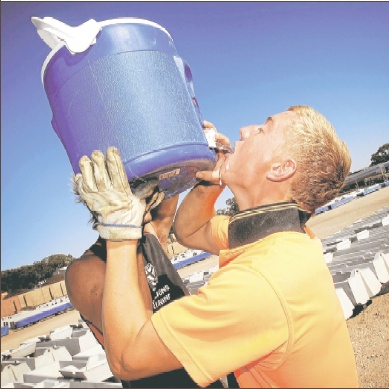Heat warning for WA workers
 With more hot weather on the way, WA authorities have issued a warning to guard against heat stress at work.
With more hot weather on the way, WA authorities have issued a warning to guard against heat stress at work.
Temperatures across Western Australia will soar well into the thirties this week, with at least a month to go until the heat peaks.
WorkSafe WA Commissioner Darren Kavanagh says there is a need to take extra care during the summer months to avoid the risk of heat stress or the more serious heat stroke.
“This warning goes out not only to outdoor workers, but also to employees that may be exposed to constant high temperatures that can result in heat stress or even heat stroke in indoor workplaces like foundries,” Mr Kavanagh says.
“Workplace safety laws require employers to ensure that workers are not exposed to hazards and this includes, as far as is practicable, protecting employees from extremes in temperature.
“The increased sweating caused by heat depletes the body’s fluids and can lead to the symptoms of heat stress - tiredness, irritability, inattention and muscular cramps.
“These symptoms don’t just cause physical discomfort, they may also increase the risk of workplace injuries by taking a worker’s attention away from the task at hand, and this is a major concern.”
Workers in extremely hot environments can lose up to a litre of fluid every hour, and it is vital that this lost fluid is replaced.
Heat stress can be avoided by taking simple steps such as drinking cool clean water at frequent intervals, having rest pauses in a cool place and helping sweat evaporate by increasing air circulation.
Heat stroke is a far more serious condition that must be treated immediately.
The signs of heat stroke are cessation in sweating, high body temperature and hot and dry skin. Confusion and loss of consciousness may occur.
If heat stroke is suspected, the person should be treated by a doctor as soon as possible.
Until medical treatment is available, the person should be cooled down as quickly as possible by methods such as soaking clothing in cold water and increasing air movement by fanning.
“Apart from the serious medical concerns arising from heat stroke, the effects of extreme or sustained heat can seriously affect a worker’s concentration levels, and the consequences of this can also be very serious,” Mr Kavanagh said.
“Guarding against heat stress and heat stroke is part of providing a safe and healthy workplace, and I urge employers to ensure that preventative measures are in place.”







 Print
Print